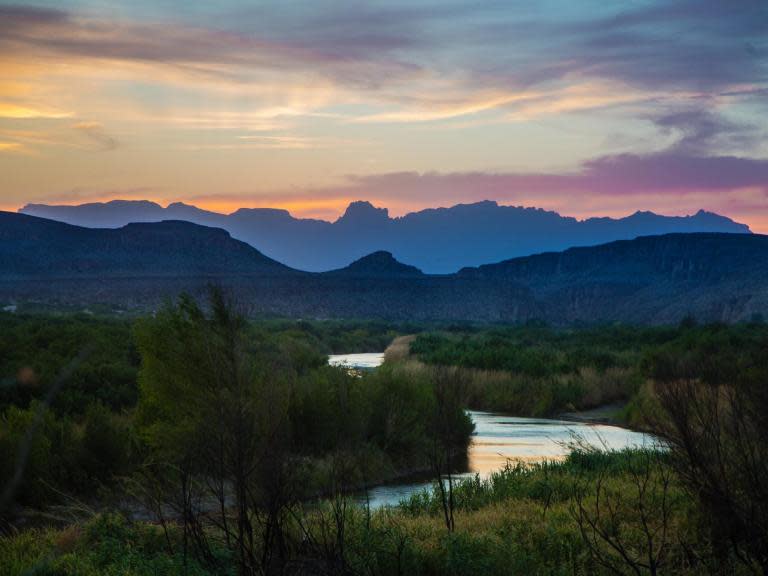Three children and one woman found dead along US-Mexico border
The bodies of what appeared to be a migrant woman in her 20s and three children – two infants and a toddler – were found on Sunday night near the edge of the Rio Grande outside the South Texas city of McAllen, authorities said.
Migrant deaths happen with grim regularity along parts of the United States’ southwestern border, largely when adults and unaccompanied teenagers succumb to harsh desert conditions or a lack of water and die of dehydration, heat stroke or hypothermia.
However, the discovery on Sunday was unusual – it is rare for officials to discover dead migrant children on the US side of the border and rarer still for the bodies of three children to be found together.
“Most of the time we usually find either adults or teenagers, but this is the first time we’ve actually found infants and toddlers, and it is pretty shocking for us,” said Hidalgo County Sheriff J E Guerra, who broke the news of the discovery on Twitter late on Sunday night.
Officials said there were as yet no signs of foul play and that the four may have died from dehydration and heat exposure. The bodies appeared to be those of immigrants in the country illegally, but neither their identities nor their country of origin had been determined on Monday.
Migrants from El Salvador, Guatemala and Honduras have crossed the border by the thousands in recent months, overwhelming Border Patrol agents, nonprofit groups and local officials.
The four bodies were found by Border Patrol agents across the river from Reynosa, Mexico, in an area on the US side of the border that is heavily travelled by Central American families. They were in a brush-covered region southeast of Anzalduas Park on federal property managed by the US Fish and Wildlife Service, near the state-run Las Palomas Wildlife Management Area, officials said.
The FBI was leading the investigation because the bodies were found on federal land.
“It’s an incredibly heartbreaking situation, which seems to happen far too often,” special agent Michelle Lee, a spokesperson for the FBI in San Antonio, said in a statement.
Early on Monday morning, Anzalduas Park was quiet. The only noises were chirping birds and a slight ripple from the river, aside from the occasional Border Patrol truck or county constable vehicle driving by.
The park – a 96-acre recreation area with picnic tables, playgrounds and a boat dock that is about 6 miles from downtown McAllen – has been a popular backdrop for visiting officials from Washington. Donald Trump passed through earlier this year during his only visit to the Texas-Mexico border as president.
The area near the park along the Rio Grande has been a migrant-crossing hub in Hidalgo County. Migrant families with children cross the river here in small or large groups on makeshift rafts and then walk inland in search of Border Patrol agents so they can turn themselves in.
Migrant deaths are more common far north of the river’s edge, on private ranchland deeper into South Texas. In those areas, water is harder to find, the terrain is more isolated and expansive, and migrants often hike for days ill-prepared for the journey.
It was unclear what went wrong for the woman and children whose bodies were found: whether they had gotten lost in the brush in the heat, whether they were already ill when they crossed the river, whether they were abandoned by smugglers or other migrants.
Mr Guerra said they were found in a makeshift staging area, a clearing near the river where groups of migrants often gather after they cross the river. From there, they typically walk deeper into the countryside to look for federal agents.
South Texas is always hot in June, but the heat has been extreme in recent days.
On Monday, the National Weather Service issued a “dangerous” heat advisory for the Rio Grande Valley region of South Texas, which includes McAllen. “Heat-related illnesses will likely occur for anyone working or playing outdoors for extended periods of time today,” the advisory said.
Over the past week in the valley, temperatures have regularly approached or exceeded 100 degrees. On Wednesday, the temperature hit 108 degrees.
The Rio Grande Valley is the busiest Border Patrol sector for migrant apprehensions on the nearly 2,000-mile border with Mexico.
In May, a total of 132,887 migrant adults and children were apprehended between ports of entry on the entire southern border, an increase from 99,304 in April, according to Customs and Border Protection, the Border Patrol’s parent agency.
Earlier this month, agents in the Rio Grande Valley sector apprehended more than 4,100 migrants in just three days.
The New York Times

 Yahoo News
Yahoo News 

